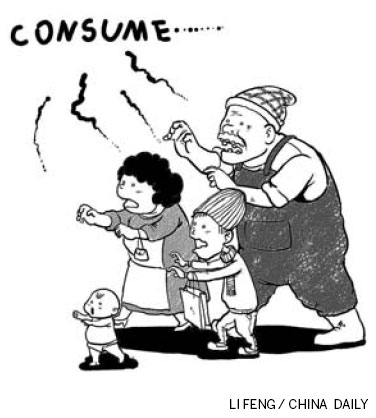An all-consuming word that turns people into economic units
Updated: 2012-01-04 13:55
By Mark Hughes (China Daily)
|
|||||||||||

If there are two words in the English language that I find increasingly irritating, they are the words "consumer" and its plural.
They crop up everywhere these days to describe people, as if their very existence is predicated solely upon consumption.
Call me old-fashioned, but I always work on the basis that buildings set alight are consumed by fire and meals served at table are consumed by diners.
But day in, day out we are assailed by economic reports that tell us weighty matters, such as "the number of gold consumers in China is rising" or "most consumers prefer high-end brands". What's wrong with "more Chinese are buying gold" or "people prefer luxury goods"?
What happened to customers, shoppers or buyers?
I'll tell you.
They have been banished by faceless number crunchers in pursuit of finding meaning in figures.
They have been slain at the altar of statistics to appease the big stock-taker in the sky.
These days, human beings are all part of the economic process.
We have been hijacked by accountants and turned into part of the financial equation. We are not creatures with souls or spirits. We are simply here on this earth to consume things that can then be measured and poured into a database to produce yet more reports on the state of the nation.
The word "consumers" (and I shudder writing it) dehumanizes mankind.
It reduces us to the merely measurable.
When I get on a train these days, I am no longer a passenger or a traveler. I have become a rail travel consumer.
All sense of romance has been stripped out of my journey. What could have been a rite of passage becomes, horror of horrors, a consumer experience.
I blame Adam Smith, the 18th century Scottish social philosopher and author of the magnum opus, An Inquiry into the Nature and Causes of the Wealth of Nations.
It was he who wrote: "Consumption is the sole end and purpose of all production; and the interest of the producer ought to be attended to, only so far as it may be necessary for promoting that of the consumer."
Smith started something that even the beatific Steve Jobs was suckered into.
Here's the founder of Apple Inc waxing lyrical about one of his products: "Design is the fundamental soul of a manmade creation that ends up expressing itself in successive outer layers of the product or service. The iMac is not just the color or translucence or the shape of the shell. The essence of the iMac is to be the finest possible consumer computer in which each element plays together."
I can forgive Jobs' purple prose because it was his genius that put an iPod in my pocket. But he simply did not need to put the word "consumer" into that verbiage. It would have made perfect sense without it.
But maybe through some subconscious need to appeal to economists, the new Masters of the Universe, he slipped it in, cozily cuddling it up to the word "computer" as if they belonged together.
But what else is a computer if it is not for a consumer? What greater tautology can there be than "consumer products"?
Products are by definition used by people, even if they are dog food that you pass on to Fido for dinner.
In the past week, I have read of people who enjoy reading novels being described as book consumers and hobby fishermen as consumers of the angling industry.
Would even the most hard-bitten economist describe the French Impressionist artist Claude Monet, he of the blurry lily pads, as first and foremost a consumer of oil paints? You know, I bet he would. No doubt to him Shakespeare was that guy who consumed a lot of quills.
I'm just waiting for him to make a land grab on religion so worshippers can become known as spirituality consumers. God forbid!
Today's Top News
Rescuers race against time for quake victims
Telecom workers restore links
Coal mine blast kills 18 in Jilin
Intl scholarship puts China on the map
More bird flu patients discharged
Gold loses sheen, but still a safe bet
US 'turns blind eye to human rights'
Telecom workers restore links
Hot Topics
Lunar probe , China growth forecasts, Emission rules get tougher, China seen through 'colored lens', International board,
Editor's Picks

|

|

|

|

|

|





